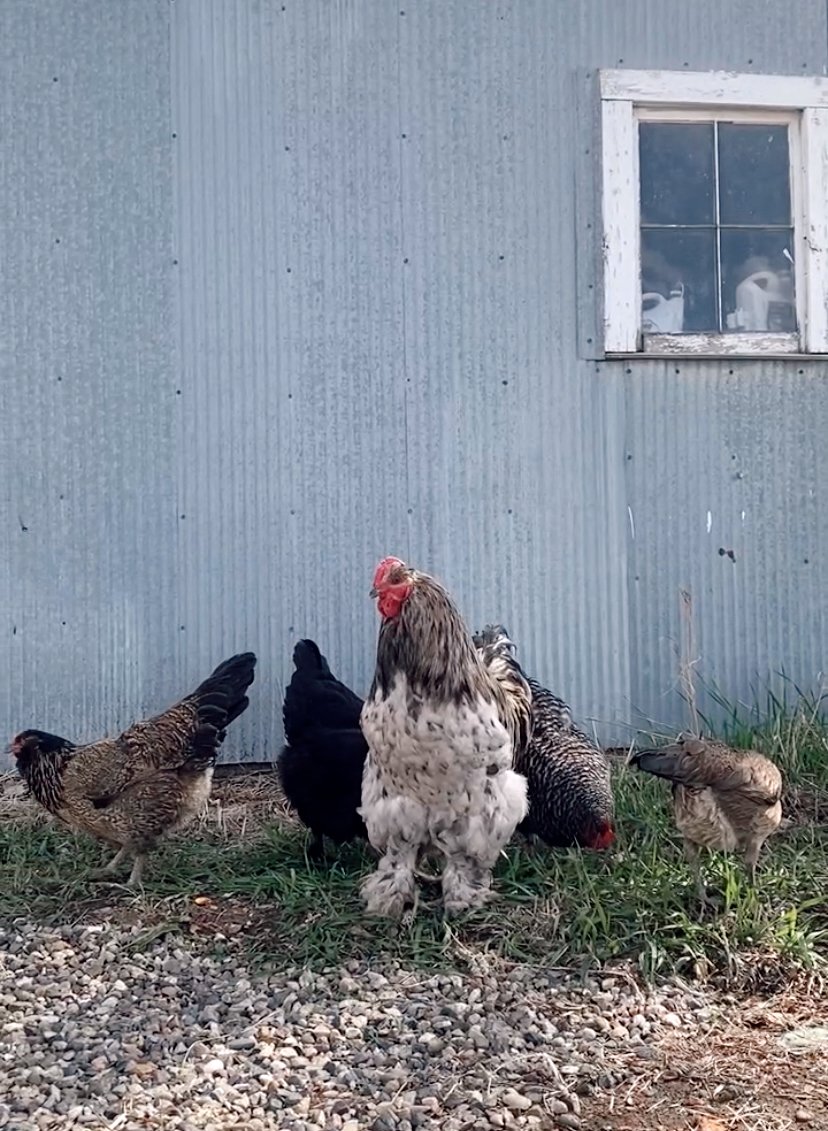Why I love free-ranging chickens.
Back when I was new to chicken keeping, the idea of free-ranging made me nervous. I didn’t trust that my chickens would make their way back to the coop, I wasn’t sure if they would be safe, and it really felt like keeping them in their run was best. I started small, by letting them out for short periods of time in the evening and making sure I was outside to keep an eye on them. It slowly progressed to letting them out more and more frequently, and now they spend most of their days outside. I do like to shut their run door and night, and my automatic coop door ensures that they are safely locked in their coop once it is dark out, but during the daytime, they have full run of the farm. I love seeing my chickens out and about, and I really believe the key to their safety is our rooster. Nothing is full-proof and while we’ve been mostly luckily with predators, there is no guarantee that your chickens will be safe free-ranging, but for me, the rewards outweigh the risk and here are some reasons why.
My chickens free ranging on the farm
The Joy of Free Ranging
First off, let’s talk about why free ranging is so wonderful. Allowing your chickens to roam freely is one of the best things you can do for them. Here are a few reasons why:
Healthier Diet: Chickens that are free to explore will snack on a variety of plants, insects, and little critters. This natural diet is packed with nutrients, leading to healthier, more vibrant birds and eggs that taste amazing. We supplement with feed, but don’t need much during the spring, summer, and fall as the chickens prefer to forage.
Happier Chickens: There’s nothing quite like watching chickens do their thing—scratching, dust bathing, and just being chickens. It keeps them mentally stimulated and physically fit.
Natural Pest Control: Your chickens will gobble up pests like ticks and grubs, helping to keep your garden and yard in check without the need for harmful chemicals. I also have heard that the protect against snakes, but it isn’t something I have witnessed so I can not attest to that. We do have our fair share of ticks so any help with those nasty little things, is much appreciated.
Saving Money: When chickens forage for their own food, you’ll see a noticeable drop in your feed bill. As mentioned, they prefer to eat what they find, and they’re pretty self-sufficient little foragers!
The Rooster's Role in a Free-Ranging Flock
While free ranging has countless benefits, it does come with its own set of challenges, particularly when it comes to keeping your chickens safe. This is where a rooster steps in as the unsung hero of the flock.
Protector Extraordinaire: Roosters are natural guardians. They’re always on the lookout for danger from predators like hawks and foxes. When a threat is near, your rooster will alert the hens with a loud, distinctive call, giving them time to seek cover. Sometimes, they’ll even put themselves in harm's way to protect their flock.
Our Rooster Big Poppa with some of his ladies
Maintaining Order: A rooster helps keep the peace within the flock. He establishes a pecking order, which reduces squabbles among the hens. This sense of order helps the flock forage more efficiently and stick together, which is crucial for their safety.
Ensuring Sustainability: If you want to expand your flock naturally, a rooster is key. He fertilizes the eggs, making it possible for you to hatch your own chicks. This way, you can keep your flock going strong without constantly buying new birds. I am new to this, but I like knowing it is an option.
Encouraging Natural Behavior: Hens feel more secure and exhibit more natural behaviors when a rooster is around. They’ll explore more confidently and fully enjoy their free-ranging lifestyle. Plus we love our giant fluff ball. He isn’t keen on strangers or even really my husband so always keep a watchful eye when the Roo is around, but ours has been mostly well-mannered.
Addressing Common Concerns
I know that keeping a rooster can come with a few concerns, so let’s address those:
Noise: Yes, roosters crow, and they can be pretty vocal about it, especially in the early morning. If you’re in a rural area, this might be less of an issue. I enjoy hearing our rooster crow and honestly, the hens can be just as loud as our rooster.
Aggression: Some roosters can be a bit feisty, especially if they haven’t been handled much. Choose a rooster with a gentle temperament and spend time socializing with him to keep aggression in check. I’ve had two aggressive roosters that I chose to cull for the safety of our kids. Third time was a charm. So don’t give up on roosters after one bad egg.
Regulations: Always check your local laws and ordinances. Some places have restrictions on keeping roosters due to the noise.
Hanging with Big Poppa
Final Thoughts
Incorporating a rooster into your free-ranging flock can elevate the whole experience for your chickens. From acting as the flock’s bodyguard to fostering natural behaviors, roosters play an invaluable role. While there are some challenges to manage, the benefits of a healthier, happier, and more secure flock make it all worthwhile.
Free-ranging your chickens and having a rooster isn’t just about practicality—it’s about embracing a natural, fulfilling way of life for your birds. Seeing a rooster lead his flock confidently around the farm is one of the many simple joys of chicken keeping.



